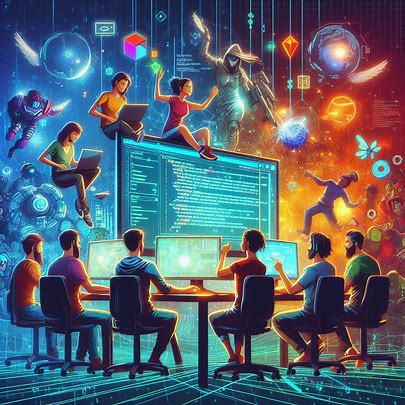Game modding has transformed from a niche hobby into a driving force behind gaming innovation. Communities of passionate players and developers tweak, enhance, and reimagine their favorite titles, often creating experiences that rival professional studios. Open-source tools like Fishstrap are at the heart of this movement, empowering creators with accessible, flexible platforms. But what does the future hold for modding? Will tools like these shape the next generation of gaming? Let’s dive into the evolving world of community-driven game customization.
Why Open-Source Tools Matter

Accessibility defines the appeal of open-source modding tools. Unlike proprietary software, which often comes with steep costs or restrictive licenses, open-source platforms are free and adaptable. Fishstrap, for example, offers a robust framework for modding games, allowing users to customize everything from graphics to gameplay mechanics. Want to get started? Download here to explore its features. This openness fosters creativity, enabling hobbyists and professionals alike to experiment without financial barriers. Moreover, the transparent nature of open-source code builds trust. Developers can inspect, modify, and optimize tools to suit their needs, ensuring a tailored modding experience.
Community Power in Modding
Modding thrives on collaboration. Open-source tools amplify this by connecting global communities. Platforms like GitHub host projects where developers share code, ideas, and feedback. Fishstrap’s community, for instance, actively contributes to its development, adding features and fixing bugs. This collective effort results in tools that evolve rapidly, often outpacing commercial alternatives. Communities also drive innovation. Consider mods like Counter-Strike, which began as a fan-made modification for Half-Life and became a standalone phenomenon. Such success stories highlight how community-driven enhancements can redefine gaming.
Shaping Next-Gen Gaming
How will open-source tools influence future games? For one, they democratize development. Indies and small studios, often limited by budgets, can leverage tools like Fishstrap to create high-quality mods or even entirely new games. This levels the playing field, fostering diversity in game genres and narratives. Additionally, open-source modding encourages experimentation. Developers can test bold ideas—like integrating AI-driven NPCs or VR mechanics—without risking massive investments. Some studios are already taking note, incorporating modding support into their titles to engage communities and extend game lifespans.
Challenges on the Horizon
Despite their promise, open-source modding tools face hurdles. Quality control can be an issue. With contributions from diverse developers, tools may suffer from inconsistent updates or bugs. Fishstrap mitigates this through rigorous community oversight, but not all platforms are as organized. Legal concerns also loom. Game publishers sometimes view mods as threats to intellectual property, leading to conflicts. Blizzard’s cease-and-desist against a Warcraft mod in the early 2000s is a notable example. Navigating these challenges requires clear communication between modders and studios, balancing creativity with respect for original works.
Technological Advancements Fueling Modding
Emerging technologies are supercharging modding’s potential. AI tools can generate assets like textures or dialogue, streamlining the creative process. Cloud gaming platforms make mods more accessible by reducing hardware demands. Meanwhile, augmented and virtual reality open new frontiers for immersive mods. Imagine a Skyrim mod that lets you explore Tamriel in full VR, crafted with open-source tools. These advancements, paired with the flexibility of platforms like Fishstrap, suggest a future where mods are not just add-ons but integral to gaming experiences.
A Collaborative Future
What’s next for game modding? Collaboration between developers and modders will likely deepen. Some studios already embrace this, releasing official modding kits to encourage community contributions. Open-source tools could bridge the gap further, enabling seamless integration of mods into mainstream games. Imagine a future where players customize their experiences in real-time, tweaking narratives or visuals mid-game. This vision aligns with the ethos of open-source: freedom, creativity, and shared progress. Tools like Fishstrap are paving the way, proving that community-driven innovation can shape gaming’s next chapter.
READ ALSO: Cross-Platform Gaming Communication: Bridging the Divide Between Different Gaming Worlds
Final Thoughts
Game modding is more than a hobby—it’s a catalyst for innovation. Open-source tools like Fishstrap empower creators, foster collaboration, and push the boundaries of what games can be. While challenges remain, the future looks bright. With technology advancing and communities growing, modding could redefine gaming, making it more inclusive, creative, and dynamic. So, whether you’re a seasoned modder or a curious newbie, now’s the time to jump in. The tools are free, the communities are welcoming, and the possibilities are endless. What will you create?
